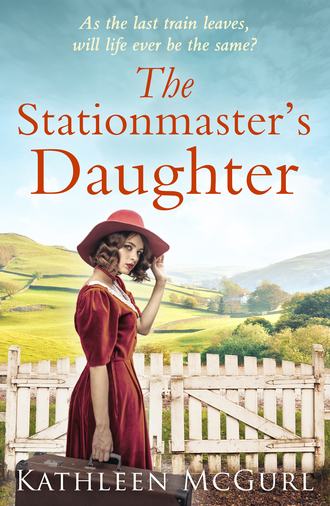
Полная версия
The Stationmaster’s Daughter
‘Ken, lad, this your daughter then? Very pleased to meet you. Going to keep your old man under control, are you?’
Ken chuckled. ‘Yes, Al. This is my Tilly. She’ll be stopping with me for a bit.’
Tilly shook Alan’s hand, and then the two men began chatting about the latest work done on the railway. It was good that her dad had a proper friend here – someone with similar interests to himself, someone he could have a laugh and a joke with, and presumably the occasional pint with, in the local pub. Friends were important when life had thrown you a curve ball.
She tuned out of Ken and Alan’s conversation and gazed around at the restored station. It was built of red brick, with grey slates, in a chalet style. Upstairs she could see a window of one of those little bedrooms, while the downstairs was much bigger, incorporating the ticket office, waiting room, and stationmaster’s quarters that she’d seen. The outside of the building was immaculate; the society had done a fantastic job restoring it. On the platform, period advertising signs and a departure board had been lovingly restored and displayed. As at Lower Berecombe, the platform was only about a foot above the trackbed. But here the platform was neatly edged with grey bricks and there were rails laid, extending in both directions, with sidings branching off just past the station.
‘What do you think?’ Ken asked.
‘Looks great. Do you get many visitors?’
Alan nodded. ‘Oh aye. On the gala days we get thousands. And during the school holidays we do very well, too. Have you shown her the engines? And the museum?’
‘There’s a museum?’ Museums were Tilly’s thing. She could spend hours peering at old photos and artefacts, reading up on the history of a place. Maybe there was something she could get interested in here, after all.
‘Well, sort of,’ Ken said, with an expression Tilly couldn’t quite read. He was plotting something, she thought. ‘It’s over here. I’ll catch up with you later, Al.’
‘Cheers, mate,’ Alan said, as he loped off around the back of the station.
Ken led Tilly along to the end of the platform then around the side of the station building to where an old railway carriage stood on a siding. A set of wooden steps led up to the door at one end. Inside, the seats had been removed and a motley collection of felt-covered boards displayed curling photographs with faded handwritten captions pinned beside them. A handful of old books about steam railways in Dorset lay on a plastic garden chair.
‘It’s not much. You saw our archive, Tillikins. The society is desperate for someone to go through it all and put together some decent displays showing the history of the railway. We’re planning on painting this coach and fitting it out as a proper museum. We’ve no problem doing the practical work, but those boxes of paperwork just scare everyone off. That’s why I hoped …’
‘That I’d take up the challenge?’ Tilly shook her head. The thought of spending the next few weeks rummaging through those boxes, piecing together an enticing tale of the railway would have appealed to her once, but now … no. It was too big a job, too daunting. ‘Not sure, Dad. I feel at the moment like I couldn’t concentrate on something like that. Maybe later on, I could give it a go.’ When she felt she could last more than twenty minutes without crying, perhaps.
Ken hugged her. ‘That’s fine by me, pet. In your own time. Come on. I need to show you the engine shed. We’ve got a replica of one of the original engines in there. Coombe Wanderer, she’s called. Built by Manning Wardle, the same company that built the originals, believe it or not. She’s a beauty. We’ll have her in action at the next gala day.’
*
Tilly spent much of the day with Ken at the old station, mostly just sitting in the sunshine on a restored wrought-iron bench painted in Southern Railway green, on the platform. Ken handed her a cup of tea from the station café and a couple of editions of the Michelhampton and Coombe Regis Railway Society’s magazine to flick through, but she struggled to concentrate. She’d read a few sentences then find her mind wandering off over the events of the last few weeks. And then her eyes would fill with tears again, and she’d have to raise them from the magazine and focus on her father and Alan, who were tinkering with a railway signal on the opposite track.
Ken drove her home in the mid-afternoon and began work on preparing the dinner for that night.
‘While I do this, pet, you go out for a walk. It’ll do you good. Just head out that way along the cliff path as far as you like, then turn around and come back. As long as you’re back before it gets dark.’
‘Maybe tomorrow,’ she protested, but Ken would not listen.
‘Tomorrow it’s due to rain all day. Today’s a better day to go. Just ten minutes, if that’s all you’re up to, but believe me, it’ll help.’
It was easier to go along with his suggestion than not. Tilly put on her trainers and headed out along the cliff path that ran behind Ken’s bungalow away from town. It rose steadily, first fenced on both sides but once she was away from the town there was a fence only on the inland side, keeping walkers out of the fields. There were a few metres of grass between the path and the cliff edge. Tilly took a few steps nearer the edge and peered over. The stony beach was a long way down, with waves crashing onto it. She wondered if the fall would kill a person instantly, or just leave them broken and battered in hospital for months.
Feeling suddenly alone and scared of her own thoughts, she pulled out her phone and punched in Jo’s number.
‘Hi, Jo. Just letting you know … everything’s OK so far.’
‘Great! Where are you now?’
‘I’m on a walk. On the cliffs. Dad sent me out.’
‘Sounds good. It’ll help, if you’ll let it, Tils. Describe it to me?’
Tilly looked around and searched for the right words. ‘The sky’s blue, fading to pink, the sea’s shimmering in the sunshine, and there are rabbits ahead of me on the path.’
‘Sounds glorious. Take me on that walk when I come to visit.’
‘Sure.’ Tilly took a deep breath. Her friend’s voice, making plans for the future, had helped calm her. Jo’s visit was something she felt she could look forward to. ‘You were right, Jo – it’s going to be good for me, living here with Dad for a bit. I’m glad you phoned him and told him.’
‘You’re doing so well, mate,’ Jo said. ‘I can’t wait to see you again. I’ll be there in a fortnight. Sean’s happy to stay home with the kids.’ Tilly felt a surge of pain and bit her lip at the mention of Jo’s children. Her children would have been the same ages as Jo’s. They’d have grown up together, gone to school together, played together.
With her first pregnancy, she and Ian had been ecstatic when the blue line showed up on the pregnancy testing kit. They’d only been trying for a couple of months, and Tilly had schooled herself not to be disappointed if they had no luck for ages. But it seemed they were both fertile, and a baby was on the way already. There’d been no sickness, and only a tenderness in her breasts to show that something was different.
And then, at around ten weeks, she began to feel a dull pain, low on the left side of her abdomen. There was a little bit of bleeding too. Tilly came home early from work, tucked herself up on the sofa with a rug and a soothing cup of tea.
‘I think I might be losing the baby,’ she said to Ian, when he arrived home.
He dropped his bag and sat down heavily opposite her, looking down at the floor. The pain in his eyes when he finally raised his eyes to hers broke her heart. ‘How come, Tils? How has it happened?’
She shook her head. ‘I don’t know.’
‘Should we go to hospital?’
‘Don’t think there’s any point, right now.’ She reached out a hand to him. ‘It might not be a miscarriage. Sometimes people bleed in pregnancy and it turns out to be OK. But not always. Jo lost her first one. She sighed. ‘If it’s going to happen, it’ll happen. I don’t think there is anything they can do, in hospital. I’d rather stay here.’
‘Can’t you do anything? Rest or something, try to keep it?’ His voice was hoarse with emotion. He really wanted this child, she realised. She hadn’t thought he felt so strongly about it.
‘I am resting,’ she replied. Why wasn’t he asking her how she felt; whether she was in any pain?
Later that night the pain increased severely. Tilly was doubled up in agony. This was more pain than Jo had described experiencing. This was far more pain. Tilly couldn’t function, couldn’t think straight. Ibuprofen made no difference. While Ian paced, muttering about how she must have done something wrong to cause this, she called the out-of-hours doctor’s number. Between spasms of pain she described her symptoms.
‘You need to go to hospital, right away,’ the doctor told her. ‘Call an ambulance if there’s no one who can drive you.’
Ian had drunk a couple of glasses of wine with his dinner, so she took the doctor’s advice and called an ambulance for herself. Thankfully it arrived very quickly. She was diagnosed with an ectopic pregnancy; her fallopian tube had ruptured, and she was in surgery within thirty minutes of being admitted.
‘Can you still get pregnant?’ Ian had asked, sitting at her bedside after the operation.
‘Yes. Though I’ll only be firing on one cylinder, as it were, so might not be fertile every month.’ It’s what she’d been told when they’d prepped her for surgery.
Ian had grimaced. ‘Well, as long as we can still have children, I suppose that’s all right. How soon until we can try again?’
Tilly put a protective hand on the surgery dressing and winced. ‘Give me a chance. They say a couple of months, at least.’
‘OK. Well, get well soon, and all that.’ Ian had patted her shoulder. It was as much sympathy as she was going to get from him, she’d realised. At the time she’d just excused it as his way of expressing his sadness at their loss.
Six months later, she was pregnant again. Ian had wanted to wrap her up in cotton wool. ‘Don’t go to your Zumba class. Don’t go running. Make sure you get a seat on the bus. This baby is precious to me.’
‘And to me!’ she’d protested. It was so precious. She wanted children at least as much as Ian did.
But that pregnancy never felt quite right. She couldn’t explain why, but it was as though her body didn’t want this embryo. At just seven weeks the bleeding started, accompanied by what felt like bad period pains. She knew she was losing the baby, but this time had no chance to tell Ian until it was all over. He was away on a training course with work, and this wasn’t something to tell him over the phone. When he returned, and she told him, his first reaction was one of anger.
‘Not again! Bloody hell, woman. Having a baby’s a natural thing. Why can’t you do it?’
She’d been calm throughout the miscarriage, dealing with it with a resigned efficiency. But Ian’s outburst was the last straw. She crumpled, throwing herself down onto the sofa, wrapping her arms around her face. ‘It’s not my fault, Ian! It just … happens. This time it wasn’t ectopic. Maybe next time will work.’ God, she hoped so. She was 37. They’d left having children until they’d established their careers and bought a big family home. Now Tilly was regretting those decisions. Perhaps in her twenties her body might have made a better job of growing a baby?
It was another year before Tilly became pregnant again. She’d insisted on waiting six months before trying, and then it just took a long time. Ian had been getting more and more frustrated each month, when she told him that no, they’d had no luck this time.
When it finally happened, they were both thrilled, and the news gave a much-needed boost to their relationship. This time the pregnancy felt right. There was breast-tenderness, sickness, a small but definite bump low down on her abdomen.
‘This time it’ll work. This time we’ll end up with a baby,’ she told him, and they made plans to decorate a bedroom in readiness, and started looking at catalogues of prams and cots and car seats.
The twelve-week scan showed a tiny but recognisable foetus, waving its little arms around, its heart beating strongly, and they were ecstatic.
Then when the bleeding had started two weeks later, it was Tilly who reacted with anger and disbelief, while Ian was the resigned one.
‘How can it be happening again?’ she screamed at him. ‘Twice is enough. How much more bad luck are we due to have?’
‘Shh,’ he said, taking her into his arms and patting her back, as though she was a child crying over a broken toy. ‘It’ll be all right.’
But it wasn’t all right. The bleeding continued, the pain intensified and at three o’clock in the morning she had a miscarriage on the bathroom floor. She sobbed, unable to believe that the same happy little person she’d seen on the ultrasound scan a fortnight ago could now be lying here cradled in the palm of her hand, dead.
Ian hadn’t wanted to see it. She’d buried the poor thing, a boy she thought, in the garden, as though it was a dead pet. Better than a hospital incinerator. At least this way she could feel close to her child. She took herself to hospital as an afterthought, and was advised to come back only if the pain or bleeding continued longer than seven days. It didn’t.
‘We should get some tests done,’ she said to Ian, ‘to find out why I keep miscarrying. Perhaps there’s something that can be done.’ She was thinking of a friend of a friend, who apparently had a rare blood clotting disorder, that meant tiny blood clots formed. Harmless for the mother but fatal for tiny embryos.
‘Sure,’ Ian replied, but there was no conviction in his voice. It was as though he’d given up trying, she thought. And yet he’d been the one who most wanted a family.
They’d drifted apart after that. There’d been no discussion of when to start trying again. Tilly had withdrawn into her grief, for the babies that hadn’t had a chance, for the family she’d hoped and expected she’d have with Ian, for their relationship, which never recovered from this final disappointment.
*
Tilly had been so caught up in memories that she hadn’t realised how far she’d walked. The path had risen well above sea level then dipped down the other side, and she was now walking into a small village that nestled between two high cliffs. Beremouth, it was called, according to signs on the footpath. Tilly felt strung out again; remembering her miscarriages had drained her emotionally. She glanced at her watch. Ken was expecting her back for dinner – but he was cooking a roast and had said it wouldn’t be ready till eight o’clock. It’d take her an hour to walk back, and that left her another hour spare before it became dark. She could do with a drink.
Tilly headed on into the little village and found a small pub overlooking the little harbour. It was the kind of place that sold more wine than beer, and served enticing-sounding light meals to visitors. She went inside and ordered a large glass of Pinot Grigio and a bowl of homemade vegetable crisps, and sat at a small table with a view of the sun sinking over the sea. She’d done the right thing coming to stay with her father, she knew. But she needed to somehow keep her mind off all that had happened. Just wallowing in the memories of her miscarriages had set her back. It wouldn’t take much to give in to it, and she’d find herself curled on the floor, crying her eyes out. That wouldn’t do, in this pub where no one knew her or where she lived.
She knocked back the last of the wine. That had disappeared very quickly. Was there time for another? The sun was just above the horizon now, and with an hour’s walk back, perhaps she should leave, rather than risk having to walk the cliff path in total darkness.
As she left the little pub, she realised there was a small corner shop across the street. Without quite realising what she was doing, she crossed over to it, went inside and bought a screw-top bottle of wine. ‘To have with dinner,’ she told herself, but she’d unscrewed the top before she’d even left the village, and spent the long walk back swigging from it.
Arriving back at Ken’s in almost complete darkness, she dropped the empty bottle into his recycling bin and went inside. A roast dinner would help soak up the alcohol. With luck, Ken would have another bottle open.
Chapter 6
Ted
It was lonely without Norah and the children around, but at the same time Ted appreciated having his home back again, the peace and quiet and the return to routine. How on earth one got used to children being always around, he had no idea. Norah seemed immune to the constant noise and bickering, especially that produced by the two boys. Maybe it was different when it was your own flesh and blood. He supposed he’d never know. The chances of him ever having a child seemed very remote. This had never bothered him before, but for some reason now it made him feel sad.
He hadn’t forgotten his conversation with Norah about Annie. Indeed, he’d spent many a sleepless night running over scenarios in which he finally plucked up the courage to speak to Annie, to say something more than simply ‘thank you’ or ‘good morning’. Endless scenarios, in which sometimes she’d scorn him and other times she’d smile and stay chatting with him, missing her train to prolong it, accepting the offer of a cup of tea. In one fantasy, she leaned towards him, put a hand on his arm, and kissed him, just lightly, on the lips. He’d been shocked at his reaction to this little daydream. He shouldn’t think of her in such a way, not before he’d even spoken to her. It wasn’t right.
And still, Monday to Friday, morning and evening, Annie passed through the station on her regular trains. The year was drawing towards its close – it was dusk by mid-afternoon. Ted made sure the station’s electric lamps were switched on well before Annie arrived for her train. He also lit a fire each afternoon in the ladies’ waiting room, in case she arrived early and wanted to sit in there. It was an extravagance, he knew, as there were so few passengers passing through. But he’d do anything for Annie.
It was a Friday morning, the week after Norah’s visit, when he finally took his chance. Annie alighted from her train wearing a bright red coat, matching hat, black stockings and heeled shoes. Her lipstick was the same shade as her coat. Her hair curled around her face, framing it to perfection. Ted held open the ticket-office door for her to pass through, and almost without realising what he was doing, said, ‘Good morning, Miss Galbraith. Might I say you look very lovely today. That colour brightens the day for all who see it.’
He felt his cheeks blush to a shade that probably matched her coat as she smiled in response – a gorgeous, wide smile, showing perfect pearl-white teeth. ‘Why, thank you, Mr Stationmaster. It’s most kind of you to say so.’
‘M-my name is Edward Morgan. M-most people call me Ted.’ But by the time he’d got the words out, she had gone.
Nevertheless, he’d done it. He’d spoken to her. Complimented her. And been rewarded by a smile and a thank-you. She wouldn’t have heard him mumbling his name. But it was a start. Something he could build on. And what a smile she’d given him! He knew he would never forget it, even if he never saw it again.
Ted spent the rest of the day smiling broadly, watching the station clock as it ticked away the minutes until Annie would return for the 17.21. He had the station at its best by mid-afternoon. The platform swept clear of dust. A roaring coal fire in the ladies’ waiting room. Flowers – a tiny posy of winter jasmine in a jam jar – on the waiting-room mantelpiece and a cushion, borrowed from his parlour and placed on the best waiting-room chair, completed the setup. His hair was combed and uniform brushed.
But it was 5.20 and there was no sign of Annie. The train pulled in, and Ted asked the driver – it was Bill – to wait a moment. ‘A regular, she must have been held up.’ He darted out to the street and looked up and down it. The dim streetlamps meant it was hard to be sure, but he could not see anyone approaching. He waited a minute and checked the station clock. 5.23 p.m. Another minute. She’d be here.
But she didn’t arrive, and Bill was impatient, and he couldn’t hold the train forever. With a sinking heart he set the signal to clear, waved his flag (red, like her coat) and the locomotive released its brakes and puffed out of the station.
Ted was worried. Should he run down to the National Provincial Bank and check if she had left, or if there was some problem, something he could help with? It felt like something that ought to be part of his duty as stationmaster, to ensure regular passengers were safe, and caught their trains. He was on his way out, locking the station door, when he stopped. He wouldn’t do this for any other passenger. He’d just assume they’d made other plans. Maybe Annie was working late today, or going out with friends in the village. Maybe she’d be travelling home on a later train. Yes, that was it. She’d be here later. He’d keep the fire going in the waiting room, just in case.
Three hours later, when the last train had passed through the station, Ted doused the fire in the waiting room, threw the little bunch of flowers out onto the track, and locked up. Annie had not caught a train that evening. He spent a sleepless night worrying about what had happened to her.
*
It was Monday before Ted saw Annie again. She was on the usual train in the morning. His heart leapt to see her, and he rushed across the platform to open the carriage door and assist her down from the train.
‘Thank you, Mr Stationmaster,’ she said, with a smile.
So she hadn’t caught his name when he’d spoken to her last week. Or at least, she’d not remembered it. Never mind. He opened his mouth to say something, but at that moment she squealed and stumbled, tripping on a scarf that was trailing out of her bag. He caught her by the arm, saving her from falling headlong out of the carriage onto the platform.
‘Miss Galbraith! Are you all right?’ he said, as he helped her to regain her balance. He bent to pick up the scarf – a flimsy, lacy affair that could not provide much warmth, he thought.
‘Oh no! Look, my coat sleeve!’ She was wearing the red coat again, the one he’d complimented her on. She must have caught it on the railway carriage door as she tripped. It was torn – a gash of about three inches from elbow to wrist.
‘And you are hurt, too,’ Ted said, noticing blood on the silky blouse sleeve that showed through the rent.
‘Am I?’ She twisted her arm around. ‘Oh! I’m bleeding!’
‘Come, sit down, Miss Galbraith.’ Ted led her gently into the ladies’ waiting room. There was no fire lit at this time of the day. He bade her sit in the best chair, which still held the cushion from his own parlour.
‘Wait, I need to take this off,’ Annie said, unbuttoning her coat, which she removed before sitting down. She then rolled up her torn blouse sleeve. Ted knelt at her side to look at the injury. It was superficial – just a scraping of the skin – but looked sore.
Outside, the train whistled. Bill must be impatient to be off. Ted glanced at his watch and realised he needed to change the signal and let the train leave, or it would be late. ‘Wait here. I’ll be back in a moment. And I’ll fetch something to bathe and dress the wound,’ he said.
Once the train was dispatched, he fetched first-aid items from his kitchen and returned to the waiting room. He bathed Annie’s wound with as much gentleness as he could muster, inwardly cursing his rough hands and lack of nursing experience. He covered it with a bandage. ‘There, Miss Galbraith. That should sort it.’
‘You are very kind, Mr Stationmaster. Oh, I cannot keep calling you that. You told me your name last week, but I confess I have forgotten it.’
‘E-Edward Morgan,’ he stammered. ‘But most people call me Ted.’
‘Then I shall, too, if you don’t mind,’ she replied. ‘I must ask you, though, how did you know my name?’







